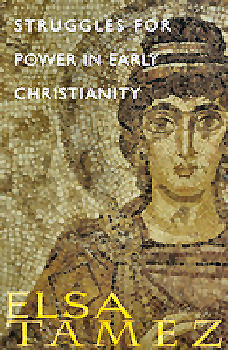
|
Posted April 18, 2007
Book: Struggles for Power in Early Christianity Author: Elsa Tamez Orbis Books. Maryknoll, NY. 2007. Pp. 163 An Excerpt from the Jacket:
The First letter to Timothy is a troubling text – especially for those concerned about the marginalization of women in the church. But rather than dismiss this text, Elsa Tamez seeks first to reconstruct the situation behind it, analyzing power struggles in the primitive church in relation to social position, gender roles, theological pluralism, and authority in the church. She tells us that “we should learn to understand and to dissent, to formulate a new manner of being the household of God so that all its members, men and women, can be welcomed and be seated with joy and mutual solidarity at the ‘table of God’s hospitality.’” An Excerpt from the Book: It is remarkable that at the beginning (Tim 2:9ff) and end of the letter there are some very cordial instructions for the wealthy who belong to the Christian community in Ephesus — at the beginning, rich women; at the end, the rich in general, women and men. In addition, in 6-6-10 our attention is powerfully drawn to an even stronger critique of those persons who want to become rich or to the rich who cling to their wealth. The strong and uncomfortable affirmation that “the love of money is the root of all evil” is mentioned here by the author of the letter. If we observe the epistle as a whole, and certain texts carefully, such as 3:1 and 5:17-25, the radical critique cannot be gratuitous. Behind it there is something that provokes this rhetorical speech. It seems to me that there is a problem of power struggles in the community, in which the wealthy, especially rich women, are an essential part. The suspicion that leads us to think in this manner is illuminated not only from the text itself. In our communities or local churches today, we frequently find that well-to-do members will challenge the leaders of the community, by-passing them to impose their own will. Could it be that something similar is what was happening in the community or communities of Ephesus? Table of Contents: 1. The rich and struggles for power in the Christian community 2. The patriarchal household and power relations between genders 3. Theological positions and the struggles for power 4. Criteria for leadership in the struggles for power Conclusion |
|
